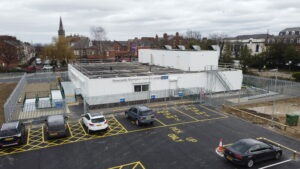
Built for clinicians, with clinicians' expertise: doing modular the Vanguard way
In times of crisis, when healthcare systems face sudden surges in demand or disruptions, the need for additional capacity becomes paramount. Modular healthcare facilities have emerged as versatile and efficient solutions to address these challenges. Whether providing for emergencies, improving patient care, or enabling innovative healthcare delivery models, these modular structures have evolved beyond mere temporary buildings to become integral components of modern healthcare infrastructure.
And, because they are more than ‘mere’ temporary buildings, at Vanguard Healthcare Solutions we ensure that they are fit for purpose, and designed by practitioners, for practitioners.
How Clinicians add to Vanguard's modular offering
Vanguard’s team of clinical experts closely collaborates with our customers throughout the process from designing the modular builds to when the facilities are up and running. Our objective extends beyond merely meeting desired capacity specifications; we are dedicated to cultivating an environment that nurtures a superior clinical experience for both patients and staff.
To achieve this goal, our team provides valuable support in multiple facets, including the meticulous mapping of clinical patient flow, the assessment of storage requirements, the optimisation of waste management processes, and the provision of comfortable staff rest accommodations. We firmly believe that these factors are pivotal in ensuring the delivery of top-tier clinical services.
Guiding all our contracts are our Clinical Services Managers (CSMs), accomplished clinical leaders with current clinical registration (NMC or HCPC). Their extensive knowledge of our mobile and modular Healthcare Spaces is instrumental in guaranteeing the delivery of exemplary clinical services.
The Newcastle Westgate Cataract Centre, established by the Newcastle upon Tyne Hospitals NHS Foundation Trust in collaboration with Vanguard Healthcare Solutions, was created to address a substantial backlog of patients awaiting routine cataract surgery, exacerbated by the COVID-19 pandemic. The modular design of the centre, featuring three operating theatres, aimed to enhance patient flow and experience, reducing the average time spent in the facility from 3-4 hours to 45 minutes to 1 hour. Pre-assessment and a streamlined one-way system were implemented to optimise the patient journey. The centre, operational within 7–8 months, performs up to 1,000 cataract procedures monthly, contributing to addressing the rising demand. The innovative design and efficient patient flow have garnered positive feedback from patients, families, and staff, with the facility serving as a successful model for expedited and patient-focused healthcare solutions.

Likewise, the modular ward established at Kettering General Hospital in the UK, and guided by our clinical team, exemplifies this approach, enhancing patient confidence while expanding capacity.
Modular healthcare facilities also play a crucial role during renovations, reconfigurations, or major construction projects. Hospitals can minimise service disruption by utilising these interim solutions. For example, the Skåne University Hospital used modular operating theatre complexes to meet the urgent demand for high-risk orthopaedic procedures during its long-term construction programme. The speed of implementation, combined with tailored features, allowed for uninterrupted care delivery during major changes.
Over the past decade, modular construction techniques have evolved significantly. They have moved beyond basic containers to encompass fully equipped, sophisticated healthcare facilities. These facilities can integrate seamlessly with existing infrastructure, providing a cohesive and visually appealing environment. Modular extensions can even be designed to be permanent, ensuring lasting benefits for healthcare institutions.
Modular solutions offer numerous advantages. They reduce project timelines, minimise operational downtime, and often deliver cost savings compared to traditional construction. Additionally, the efficient manufacturing process of modular units can be more sustainable, with reduced waste and resource consumption. This aligns with the growing focus on eco-friendly practices in healthcare infrastructure development.

In conclusion, modular healthcare facilities have evolved from being mere temporary solutions to becoming integral components of modern healthcare systems. Their ability to rapidly expand capacity, adapt to changing needs, reassure patients, and support innovative care models where practitioners needs are taken into account makes them indispensable tools for healthcare institutions. We truly believe the best way to achieve enhanced patent care and experience through modular build starts with a practitioner’s, or a clinician's perspective. And, for them to work closely through all stages to maximise the care pathway.
Vanguard provides a suite of clinician-based support which provides hospitals with the teams they need to operate these facilities effectively. All this makes Vanguard’s modular offering an imperative for any healthcare organisation.
Get in touch with Nigel Knight here to book an appointment to discuss how Vanguard’s modular solutions can help you.